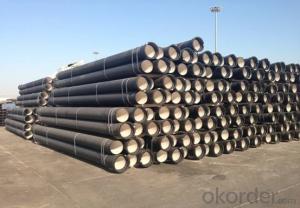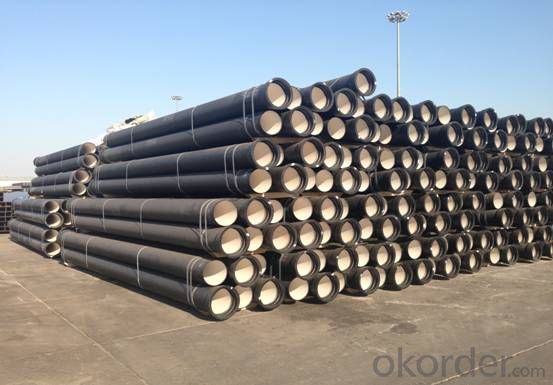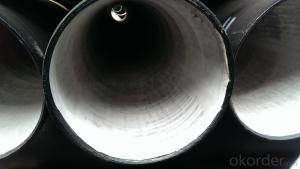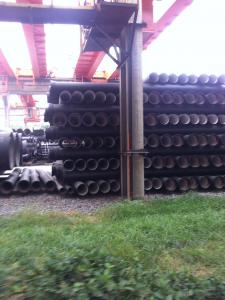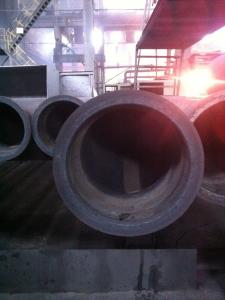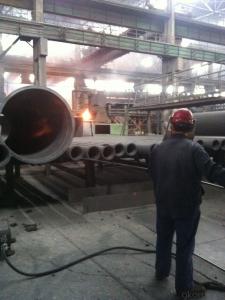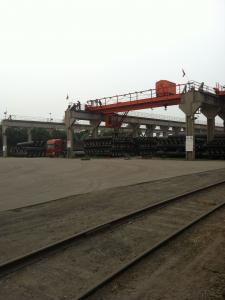DUCTILE IRON PIPES AND PIPE FITTINGS K9 CLASS DN1400
- Loading Port:
- Tianjin
- Payment Terms:
- TT OR LC
- Min Order Qty:
- 22 pc
- Supply Capability:
- 3000 pc/month
OKorder Service Pledge
OKorder Financial Service
You Might Also Like
Material : Ductile Cast Iron
Size Range : DN 80mm to DN 2000mm
Unit Effective Length : 6m or 5.7m
Manufacture Standard: ISO 2531:1998/ EN 545:2006/EN 598:2007
Annual capacity : 200,000 tons
Coating Exterior: Zinc 130g/m2 according to ISO 8179-1 and bitumen coating 70 microns.
Cement Interior: Portland Cement/ High Alumina Cement/ Sulphate Resisting Cement Lining according to ISO 4179
Special requirements on external coating and internal lining can be applied
We also provide accessories such as SBR/EPDM rubber gaskets, lubricant paste, pipe caps, PE sleeves, etc.
Additional Parts:
Each pipe is strictly inspected according to related standard to ensure permanently high performance.
Easy Installation at site and service free for life
Long Service Lifespan
Quotation will arrive you within 24hours once we get your inquiry.
We guarantee offering you a competitive price.
A copy of original inspection reports of pipes will be offered after shipment.
Photos of loading process will be sent to the customer after shipment effect.
We will follow-up the delivery progress after shipment effect and update to the customer on weekly basis.
- Q: Are ductile iron pipes suitable for use in irrigation gate systems?
- Yes, ductile iron pipes are suitable for use in irrigation gate systems. Ductile iron is known for its durability, strength, and corrosion resistance, making it an ideal choice for applications requiring reliable and long-lasting piping systems like irrigation gate systems. Additionally, ductile iron pipes have excellent flow characteristics, allowing for efficient water distribution in irrigation systems.
- Q: Are ductile iron pipes suitable for oil and gas pipeline applications?
- Yes, ductile iron pipes are suitable for oil and gas pipeline applications. Ductile iron pipes have numerous properties that make them ideal for use in such applications. Firstly, ductile iron pipes have high tensile strength, which allows them to handle the high pressure and stress associated with oil and gas transmission. This ensures that the pipes can withstand the demanding conditions and maintain structural integrity over time. Secondly, ductile iron pipes are highly resistant to corrosion. Oil and gas pipelines are exposed to various corrosive elements, such as water, chemicals, and salts. Ductile iron pipes have a protective lining, typically made of cement mortar or polyethylene, which prevents corrosion and extends the lifespan of the pipes. Additionally, ductile iron pipes have excellent durability and longevity. They have a long service life, typically ranging from 50 to 100 years, depending on the specific conditions and maintenance practices. This makes them a reliable choice for oil and gas pipeline applications, reducing the need for frequent replacements and minimizing downtime. Furthermore, ductile iron pipes have good flexibility, allowing them to withstand ground movement and absorb shocks and vibrations. This flexibility is particularly important in oil and gas pipeline applications, where the pipes need to adapt to changing terrain and environmental conditions. Lastly, ductile iron pipes are cost-effective compared to other materials commonly used in oil and gas pipelines, such as steel. They offer a favorable balance between performance and price, making them a practical choice for both large-scale and small-scale pipeline projects. Overall, the combination of high tensile strength, corrosion resistance, durability, flexibility, and cost-effectiveness makes ductile iron pipes suitable for oil and gas pipeline applications.
- Q: Is it better to use steel tubes or ductile iron pipes for water supply?
- Flexible seamless steel pipe is good toughness, good processing, better than ductile iron corrosion resistance, the price is slightly higher;
- Q: What are the common pressure ratings for ductile iron pipes?
- The pressure ratings for ductile iron pipes can vary depending on the application and industry standards. However, the most commonly used pressure ratings are Class 150, Class 200, Class 250, and Class 350. For low-pressure applications, Class 150 ductile iron pipes are typically used. These pipes have a working pressure of up to 150 psi and are commonly used for water distribution systems, irrigation, and gravity flow sewer systems. For applications requiring slightly higher pressure, such as industrial water supply and fire protection systems, Class 200 ductile iron pipes are used. These pipes have a working pressure of up to 200 psi. For more demanding applications, Class 250 ductile iron pipes are suitable. These pipes have a working pressure of up to 250 psi and are used for high-pressure water supply systems, power plants, and municipal water distribution networks. For heavy-duty applications, such as industrial water supply and oil and gas pipelines, Class 350 ductile iron pipes are used. These pipes have the highest working pressure rating, with a maximum pressure of up to 350 psi. It is important to note that these pressure ratings are general guidelines and can vary depending on the manufacturer and product specifications. Consulting industry standards and guidelines, as well as working with qualified engineers and professionals, is crucial to ensure the correct pressure rating is selected for a specific ductile iron pipe application.
- Q: What is the purpose of ductile iron pipes?
- Ductile iron pipes serve the crucial function of establishing a dependable and sturdy infrastructure for fluid transportation, including water, sewage, and gas. In comparison to steel or PVC pipes, ductile iron pipes offer notable advantages. One primary objective lies in ensuring the secure and efficient distribution of water to communities. Ductile iron pipes are specifically designed to endure high pressures and endure the challenging conditions found underground, rendering them an excellent choice for water supply systems. With their extended lifespan and minimal maintenance requirements, the necessity for frequent repairs or replacements is greatly reduced. Another purpose involves the efficient conveyance of sewage and wastewater. Ductile iron pipes possess exceptional resistance to corrosion, guaranteeing their ability to withstand the corrosive properties of sewage and other waste materials. Additionally, their structural strength enables them to endure heavy loads and ground movements, making them well-suited for underground sewer systems. Ductile iron pipes are also employed for gas transportation. Their remarkable mechanical properties empower them to withstand applications involving high pressures, making them the ideal choice for gas distribution networks. Furthermore, their durability and resistance to external factors like soil movement or temperature changes establish them as a reliable option for gas transmission systems. In essence, the overarching purpose of ductile iron pipes is to provide a resilient and enduring solution for the safe and efficient transportation of fluids. By contributing to the development and maintenance of essential infrastructure systems, they effectively support the needs of our communities.
- Q: What is the expected joint flexibility of ductile iron pipes?
- The expected joint flexibility of ductile iron pipes is typically high due to their inherent material properties. Ductile iron is known for its excellent ductility, which refers to its ability to deform without fracturing. This characteristic allows ductile iron pipes to withstand external loads, ground movement, and pressure fluctuations without major damage. The joints in ductile iron pipes are typically designed to provide additional flexibility and accommodate movement. The most common joint type used in ductile iron pipes is the push-on joint, which allows for angular deflection and axial movement. These joints consist of a rubber gasket that creates a watertight seal and allows for slight movement between pipe sections. The expected joint flexibility depends on various factors, including the pipe diameter, joint type, and installation methods. Generally, ductile iron pipes can accommodate angular deflection up to a certain degree, typically ranging from 5 to 10 degrees, depending on the joint design. Axial movement can also be accommodated to some extent, allowing for expansion and contraction of the pipe system. It is important to note that joint flexibility may vary depending on the specific manufacturer and product specifications. Therefore, it is recommended to consult the manufacturer's guidelines and specifications for the expected joint flexibility of a particular ductile iron pipe product.
- Q: What is the expected bending stress capacity of ductile iron pipes?
- The expected bending stress capacity of ductile iron pipes can vary depending on various factors such as the pipe's diameter, wall thickness, and the specific grade of ductile iron used. However, generally speaking, ductile iron pipes have a high bending stress capacity compared to other pipe materials. Ductile iron pipes are known for their high tensile strength and flexibility, making them capable of withstanding significant bending stresses. The exact bending stress capacity can be determined through rigorous testing and analysis by considering factors like the pipe's mechanical properties, dimensions, and the maximum allowable deflection. It is important to note that the bending stress capacity of ductile iron pipes should be evaluated in accordance with industry standards and guidelines. These may include standards such as the American Water Works Association (AWWA) C150 or International Organization for Standardization (ISO) 2531, which provide specifications and testing methods for ductile iron pipes. Ultimately, the expected bending stress capacity of ductile iron pipes is determined by several factors and should be assessed based on the specific requirements of the application, considering industry standards and guidelines for accurate and reliable results.
- Q: How to distinguish flexible and rigid interfaces between cast iron pipe joints
- Flexible connections can be kept watertight at any angle (lateral or vertical), and rigid, where the interface of a pipe is easy to crack if a slight earthquake is encountered
- Q: What is the difference between flexible joint mechanism and seismic cast iron pipe DN100 and ductile iron pipe?
- The ball compressive strength of ductile iron pipe is much higher than that of cast iron pipes, buried in the ground, the car is not easy to be crushed.
- Q: How does ductile iron pipe perform in areas with high seismic activity?
- Ductile iron pipe possesses exceptional strength and durability, making it an ideal choice for areas with high seismic activity. Seismic events, such as earthquakes, can exert significant stress and strain on pipelines, leading to rupture or failure. However, ductile iron pipe's unique material properties enable it to withstand these dynamic forces. One of the main advantages of ductile iron pipe in seismic regions is its remarkable flexibility. Unlike rigid materials like cast iron or steel, ductile iron exhibits a higher degree of elasticity. This allows it to deform and absorb energy during seismic events, dissipating the seismic forces and reducing the risk of pipe failure. Consequently, damage to the overall pipeline system is minimized. Furthermore, ductile iron pipe is manufactured with a high level of ductility, meaning it can undergo substantial deformation without fracturing. This characteristic is particularly crucial in seismic zones as it enables the pipe to endure ground movements and seismic waves without compromising its structural integrity. Additionally, the ability of ductile iron to absorb and redistribute stress helps prevent localized failures, ensuring the pipeline system's overall stability and reliability. Additionally, ductile iron pipe possesses excellent corrosion resistance, which is especially vital in high seismic areas where ground movement and subsequent water leaks can compromise the pipe's integrity. The corrosion resistance of ductile iron ensures the longevity and reliability of the pipeline system, minimizing the risk of leaks or failures during seismic events. In conclusion, ductile iron pipe performs exceptionally well in areas with high seismic activity due to its superior flexibility, high ductility, and corrosion resistance. These properties allow the pipe to withstand the dynamic forces generated during seismic events, providing a reliable and long-lasting solution for fluid transportation and ensuring the safety of communities in earthquake-prone regions.
Send your message to us
DUCTILE IRON PIPES AND PIPE FITTINGS K9 CLASS DN1400
- Loading Port:
- Tianjin
- Payment Terms:
- TT OR LC
- Min Order Qty:
- 22 pc
- Supply Capability:
- 3000 pc/month
OKorder Service Pledge
OKorder Financial Service
Similar products
Hot products
Hot Searches
Related keywords
